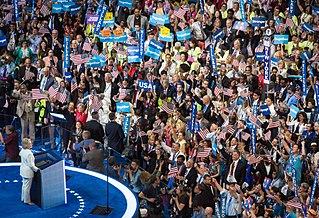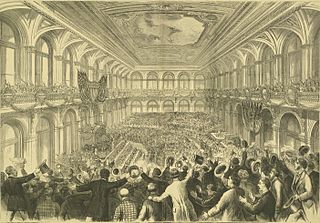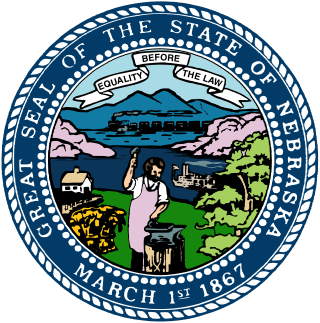
Each of the 50 U.S. states, the District of Columbia, and five territories of the United States holds either primary elections or caucuses to help nominate individual candidates for president of the United States. This process is designed to choose the candidates that will represent their political parties in the general election.

The Democratic National Convention (DNC) is a series of presidential nominating conventions held every four years since 1832 by the United States Democratic Party. They have been administered by the Democratic National Committee since the 1852 national convention. The primary goal of the Democratic National Convention is to officially nominate a candidate for president and vice president, adopt a comprehensive party platform, and unify the party. Pledged delegates from all fifty U.S. states, the District of Columbia, and the American territories, and superdelegates which are unpledged delegates representing the Democratic establishment, attend the convention and cast their votes to choose the party's presidential candidate. Like the Republican National Convention, the Democratic National Convention marks the formal end of the primary election period and the start of the general election season. Since the 1980s, national conventions have become mostly inaugural events for the winning candidate, since winners are announced long before the convention. In 2020, both major parties, and many minor parties, replaced their usual in-person conventions with virtual programs due to the COVID-19 pandemic.
In American politics, a superdelegate is a delegate to a presidential nominating convention who is seated automatically.

A United States presidential nominating convention is a political convention held every four years in the United States by most of the political parties who will be fielding nominees in the upcoming U.S. presidential election. The formal purpose of such a convention is to select the party's nominees for popular election as President and Vice President, as well as to adopt a statement of party principles and goals known as the party platform and adopt the rules for the party's activities, including the presidential nominating process for the next election cycle. Conventions remain an important part of the political process despite the nominees almost always being determined during the primary season, as they provide positive publicity for the nominee and party, which can then lead to a convention bounce.

From January 3 to June 3, 2008, voters of the Democratic Party chose their nominee for president in the 2008 United States presidential election. Senator Barack Obama of Illinois was selected as the nominee, becoming the first African American to secure the presidential nomination of any major political party in the United States. Due to a close race between Obama and Senator Hillary Clinton of New York, the contest remained competitive for longer than expected; neither candidate received enough pledged delegates from state primaries and caucuses to achieve a majority, without endorsements from unpledged delegates (superdelegates).
The results of the 2008 Democratic Party presidential primaries are the detailed outcomes of a series of contests by which members of the United States Democratic Party chose their candidate for the 2008 U.S. presidential election. The contests are held in each of the fifty U.S. states, as well as the District of Columbia, Puerto Rico, American Samoa, Guam, the U.S. Virgin Islands, and Democrats Abroad. The Northern Mariana Islands was the lone U.S. state or territory which did not have a primary or caucus election in 2008. The outcomes include totals of delegates selected as well as popular votes.

The 2008 Democrats Abroad presidential primary took place from February 5, 2008 until February 12.

The 2008 Nebraska Democratic presidential caucuses took place on February 9, 2008, where 24 of the state's 31 convention delegates were chosen. Like he did throughout many other states that held caucuses instead of primaries, Barack Obama won the Nebraska Democratic Caucus by more than a two-to-one margin of victory over Hillary Clinton. On May 13, 2008, the state also held a non-binding primary election which Obama also won but the margin of victory was considerably smaller.

The 2008 Rhode Island Democratic presidential primary took place on March 4, 2008. It was an open primary. 21 delegates were awarded on a proportional basis. Rhode Island's delegation to the 2008 Democratic National Convention also included 11 superdelegates whose votes were not bound by the results of the primary election. Hillary Clinton won the primary.

The 2008 Texas Democratic presidential primary and caucuses were a series of events to determine the delegates that the Texas Democratic Party sent to the 2008 Democratic National Convention. Delegates were selected using results from two sources: the Texas Presidential Primary held on March 4 by the Secretary of State of Texas's office, and a series of caucus events held between March 4 and June 7 by the Texas Democratic Party. The indecisive results of Super Tuesday, and the fact that Texas had the largest number of delegates among the states remaining on the Democratic primary calendar, resulted in the Texas primary receiving significant attention from both the Hillary Clinton and Barack Obama campaigns.

From January 3 to June 5, 2012, voters of the Democratic Party chose its nominee for president in the 2012 United States presidential election. President Barack Obama won the Democratic Party nomination by securing more than the required 2,383 delegates on April 3, 2012, after a series of primary elections and caucuses. He was formally nominated by the 2012 Democratic National Convention on September 5, 2012, in Charlotte, North Carolina.

Presidential primaries and caucuses were organized by the Democratic Party to select the 4,051 delegates to the 2016 Democratic National Convention held July 25–28 and determine the nominee for President in the 2016 United States presidential election. The elections took place within all fifty U.S. states, the District of Columbia, five U.S. territories, and Democrats Abroad and occurred between February 1 and June 14, 2016. Between 2008 and 2020, this was the only Democratic Party primary in which the nominee had never been nor had ever become President of the United States. This was the first time the Democratic primary had nominated a woman for president.
Democrats Abroad holds a primary awarding delegates to the Democratic National Convention to represent expatriate voters. This primary is conducted as part of the Democratic Party's presidential primaries. In some earlier elections, in place of a primary, a caucus system was used by Democrats Abroad to determine their convention delegations.

The 2020 Democrats Abroad Presidential Primary took place from March 3 to 10, 2020, allowing U.S. citizens residing outside the United States and those officially affiliated with Democrats Abroad to participate in the Democratic Party's 2020 presidential nomination process. Spanning more than 230 voting locations worldwide, participants cast their in-person votes across various countries and continents. Alternative voting methods included e-mail and postal mail. The voting period started on Super Tuesday and concluded the Tuesday of the following week. The 2020 Democrats Abroad Global Primary allocated a total of 21 delegates to the 2020 Democratic National Convention. Among these, 13 were pledged delegates, committed to supporting a specific candidate based on primary results, each holding a full vote. Additionally, 8 automatic delegates, unbound to any candidate and each possessing a half vote, contributed to a cumulative total of 17 votes.

The 2020 Idaho Democratic presidential primary took place on March 10, 2020, as one of several states voting the week after Super Tuesday in the Democratic Party primaries for the 2020 presidential election. The Idaho primary required that voters would be registered Democrats or unaffiliated, and awarded 25 delegates towards the 2020 Democratic National Convention, of whom 20 were pledged delegates allocated on the basis of the primary results.

The 2020 Mississippi Democratic presidential primary took place on March 10, 2020, as one of several states voting the week after Super Tuesday in the Democratic Party primaries for the 2020 presidential election. The Mississippi primary was an open primary, with the state awarding 41 delegates towards the 2020 Democratic National Convention, of which 36 were pledged delegates allocated on the basis of the results of the primary.

The 2020 Missouri Democratic presidential primary took place on March 10, 2020, as one of several states voting the week after Super Tuesday in the Democratic Party primaries for the 2020 presidential election. The Missouri primary was an open primary, with the state awarding 79 delegates towards the 2020 Democratic National Convention, of which 68 were pledged delegates allocated on the basis of the results of the primary.

The 2020 North Dakota Democratic presidential caucuses took place on March 10, 2020, as one of several states voting the week after Super Tuesday in the Democratic Party primaries and caucuses for the 2020 presidential election. While the contest has in effect been a party-run open primary for the first time in North Dakota's history, the state party retained the traditional caucus name, classifying it as a firehouse caucus. The state awarded 18 delegates to the 2020 Democratic National Convention, of which 14 were pledged delegates allocated on the basis of the results of the election.

The 2020 Connecticut Democratic presidential primary took place on August 11, 2020, as part of the Democratic Party primaries for the 2020 presidential election. It was originally to take place on April 28, 2020, as one of several northeastern states in the "Acela primary", but was rescheduled twice due to the COVID-19 pandemic. The state was the last one to hold a Democratic presidential contest long before the penultimate contest more than a month prior and had been pushed to only one week before the rescheduled 2020 Democratic National Convention. The Connecticut primary was a closed primary, with the state awarding 75 delegates to the national convention, of which 60 were pledged delegates allocated on the basis of the primary results.

Although the United States Virgin Islands did not participate in the 2020 presidential election because it is a U.S. territory and not a state, it still participated in the U.S. presidential caucuses and primaries. Former vice president Joe Biden won the Democratic caucuses, held on June 6. The Republican caucuses, held on March 14 in the form of a territorial convention, voted for incumbent president Donald Trump.

















